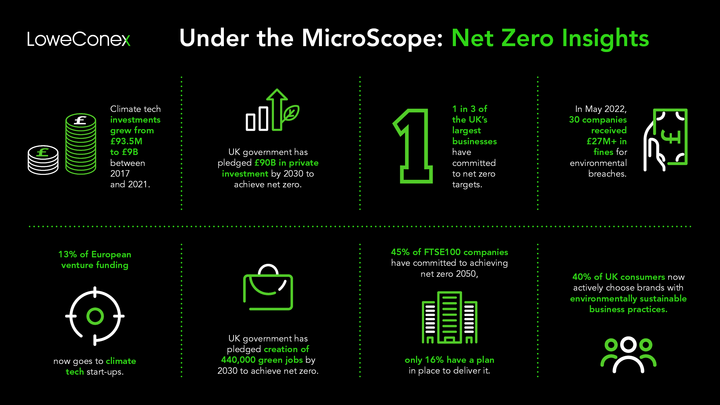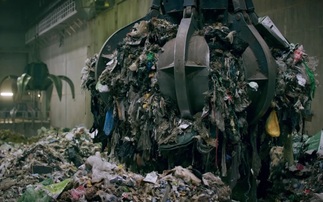
Calls on corporates to deliver on climate goals are growing from regulators, consumers and investors - LoweConex’s Jessica Caldwell looks at how under pressure sustainability teams can accelerate progress.
In its landmark Net Zero Strategy, the UK government pledged to unlock £90bn in private investment and create 440,000 green jobs by 2030 on the path to reaching net zero emissions in 2050.
But a net zero economy demands net zero commitments. Since the launch of the strategy last October, one in three of the UK's largest businesses have committed to net zero targets, and tasked sustainability professionals with making environmental requirements a reality.
Under the pressure of eco-conscious consumers, attracting investment and combating climate change, it's no surprise businesses feel compelled to establish ambitious objectives.
However, when a business makes large scale commitments it's inevitably met with a mixture of applause and scepticism. And understandably so - while 45 per cent of FTSE100 companies have committed to achieving net zero by 2050 or sooner, only 16 per cent have a plan in place to achieve it.
An uncomfortable precedent is being set of target commitments backed by sustainable statements instead of sustainable actions.
This potent combination of consumer and corporate expectations means sustainability teams are not only being asked to deliver results, but accelerate progress.
Yet multi-departmental buy-in for sustainability initiatives remains challenging. Solutions are available for selection but belong to a rapidly developing climate tech sector and strategic spend is highly scrutinised for return on investment.
So, are climate change targets realistic? Or are we at risk of compromising lasting progress for quick-win initiatives which lack a solid foundation?
Mind the gap - a lack of data risks derailing sustainable success.
Businesses are emerging at breakneck speed from an undefined era of voluntary sustainability initiatives, which created a lack of purpose to collect relevant data. We are now entering a second 'sustainability millennium' which demands meaningful data to meet mandated minimums and measure performance.
Now at a critical turning point of changing rules and mounting legislative requirements, sustainability teams are being asked to set targets and find solutions with an inherited lack of understanding of their businesses' state of sustainability affairs.
And the importance of getting it right is growing, with the first fines issued for breaches of climate change schemes earlier this year. In May, the body dished out £27m of fines to 30 companies, relating to the EU Emissions Trading Scheme, Climate Change Agreements Scheme and the Energy Saving Opportunities Scheme.
Meanwhile, 40 per cent of UK consumers are now actively choosing brands and companies that have environmentally sustainable business practices. That means 40 per cent of UK consumers are at risk of putting products back on the shelf or not selecting certain services if businesses miss the proverbial mark.
The outcome? Under-pressure sustainability teams are often forced to run blind, creating initiatives using performance benchmarks based on aspirations rather than accurate data.
The choice? Make targets or face commercial risks
It is a chain reaction — a lack of data leads to a lack of achievements.
Collaboration is widely advertised as the secret to success but it's impossible to align sustainability commitments across a business without access to the right information.
When teams lack access to vital green data they are being short-changed of a source that helps pay the invaluable price of internal buy-in.
Successfully navigating the corporate commitment maze across a myriad of traditional business functions requires compelling cases for environmental change that prove positive impact externally and internally.
This could be the sustainability savings departments could achieve, the value of repurposed time to concentrate on strategic initiatives, or the advantages of enhanced transparency to simplify reporting for senior leaders.
When sustainability teams lack the vital green data needed to bring the present and targeted carbon demands into cross-departmental strategies, opportunities get missed, and businesses underachieve.
Bridging the gap - the rise of net zero technologies.
The meteoric rise of climate tech arrives when there is less than ten years to halve global greenhouse emissions to meet climate goals.
Climate tech has become the fastest-growing vertical in the EU. Investments grew tenfold from £93.5m to £9bn between 2017 and 2021, and some 13 per cent of European venture funding now goes to climate tech start-ups.
The outcome is a new wave of cutting-edge Internet of Things (IoT) technologies. Systems like LoweConex's harness estate-wide sustainability and asset performance data into a centralised location. This can help sustainability teams understand their starting point, connect otherwise unrelated data to understand previously unrealised impacts on performance, and access the numbers needed to aid departmental buy-in.
But the benefits of IoT don't stop at creating accurate benchmarks, informing sustainable initiatives, or delivering performance reporting that keeps businesses compliant and calls for ROI analysis swiftly answered. It also opens up the ability to automate asset management operations to accelerate emission reductions even faster.
In summary:
- Environmental frameworks provide structure to unlock green investment and focus commercial attention on climate progress
- Sustainability teams are under pressure to overcome internal challenges and deliver external results
- Targets aren't the problem; it's the underlying data informing their design that's the issue
- Turning aspirations into transformative action needs the right data intelligence
- Net zero technology is the tool that will empower sustainability teams to achieve and accelerate targeted progress, via accurate data and automated actions

Jessica Caldwell is head of product LoweConex, a cloud-based IoT software platform and hardware solution that enables retailers to implement intelligent automation at scale







